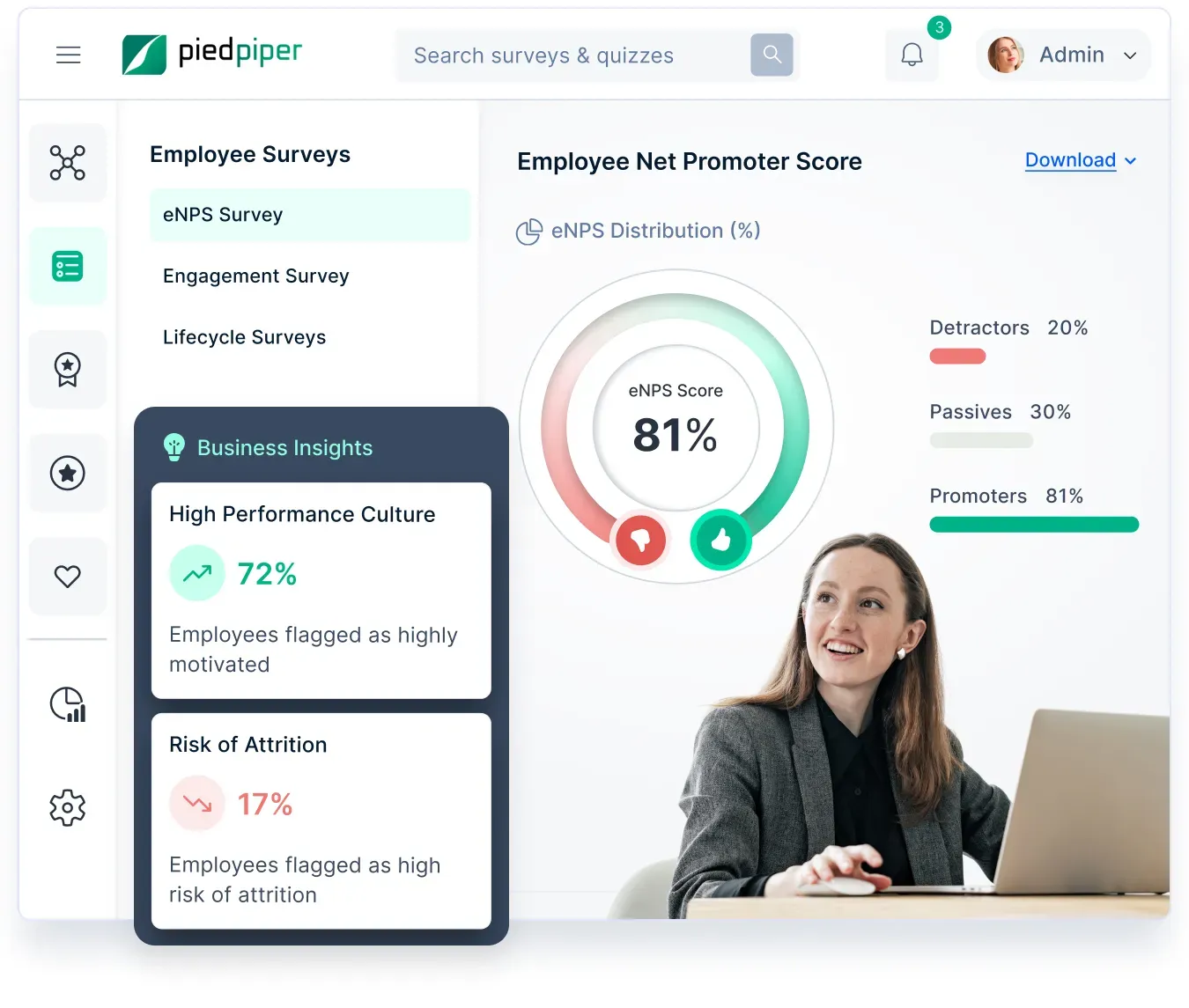34 Self-Evaluation Questions for Employees to Improve Performance
elf-evaluation is a powerful tool for employees to reflect on their performance, identify strengths, and set career goals. This guide provides 50 self-evaluation questions to help employees take ownership of their growth and for employers to improve feedback and development processes.
On this page
Performance reviews play a key role in aligning employee efforts with company goals. Self-evaluation questions for employees encourage active engagement, accountability, and personal growth, making performance assessments more effective.
A self-evaluation questionnaire for employees allows them to reflect on their work, assess strengths and weaknesses, and set future goals. It also gives employers insights into training needs, employee satisfaction, and workplace challenges.
In this blog, we will cover questions for employee self-evaluation that help employees review their performance, identify areas for improvement, and take charge of their professional development. Whether you're an employee seeking growth or an employer aiming to support your team, these self-evaluation questions can be a powerful tool for success.
What are self-evaluation questions?
Self-evaluation questions are prompts designed to help employees assess their workplace performance, skills, and contributions. These questions encourage individuals to reflect on their achievements, challenges, and areas for improvement, fostering a sense of accountability and personal growth.
A self-evaluation questionnaire for employees typically includes questions about job performance, goal-setting, collaboration, and professional development. By answering these questions, employees understand their strengths better, identify skills they need to improve, and take ownership of their career progression.
Employers also benefit from questions for employee self-evaluation, as they provide valuable insights into employee satisfaction, engagement, and training needs, helping organizations create a more supportive and growth-oriented work environment.
Why employee self-evaluation surveys are important
Employee self-evaluation surveys play a crucial role in performance management, professional development, and workplace engagement. They allow employees to reflect on their strengths, areas for improvement, and career goals, fostering a sense of accountability and ownership over their progress.
- Encourages self-awareness and growth: Self-evaluation surveys help employees assess their achievements, challenges, and areas for development, allowing them to take an active role in their career progression.
- Improves communication between employees and managers: These surveys create opportunities for meaningful discussions about performance expectations, career aspirations, and feedback, strengthening manager-employee relationships.
- Aligns individual goals with company objectives: Employees better understand how their contributions impact the organization, ensuring their efforts are aligned with business goals and expectations.
- Identifies training and development needs: Employers can use self-evaluation insights to pinpoint skill gaps, offer targeted training programs, and support employees in their professional growth.
- Boosts engagement and job satisfaction: When employees feel heard and involved in their development, they are more engaged, motivated, and satisfied with their roles, reducing turnover.
By integrating self-evaluation questionnaires for employees into performance reviews, organizations can empower employees, enhance feedback processes, and create a culture of continuous improvement.
34 Employee self-evaluation questions
You might include the following kinds of self-evaluation questions in an employee self-evaluation:
Employee self-evaluation questions regarding the job
These questions are intended to help the employee in reviewing specific parts of their own work:
1. Take a look at your job description. Are there any tasks that need more time or that you no longer perform?
2. Describe the duties you have taken on or the difficulties you have faced since your previous performance review.
3. What aspect of your present job do you like best?
4. What elements of your employment would you prefer to modify or remove the most, and why?
Employee self evaluation questions regarding performance
These inquiries are intended to aid workers in considering how they performed on the job:
5. What were your main goals for the position, and how well do you think you accomplished them?
6. What three things did you accomplish successfully during the past three months? Why do you think your efforts were fruitful?
7. Where do you believe your abilities would be most valuable? Exist any particular regions or projects?
8. Give an example of a challenging circumstance you handled well, highlighting your abilities and how you got there.
9. Since the last time you spoke with your manager, how would you rank your performance? Why do you rate yourself so highly?
10. What have you accomplished most recently, say in the past three to six months?
11. What objectives from your last evaluation do you wish you had achieved but didn't?
12. Anything that may have supported you in achieving those objectives? If so, what?
13. What tasks do you carry out that are not part of your current position?
14. What objectives relevant to your position do you want to meet during the next review period?
15. What actions can your boss do to support you in achieving those objectives?
16. What can the company do to support you in achieving your objectives?
Employee self-evaluation questions regarding professional development
These questions are meant to get employees to consider where they wish to grow professionally.
17. What are a few instances of how your professional development has progressed throughout the most recent review period?
18. How much time and money do you think you devote to your own professional development? Please provide the reasoning for your decision.
19. What professional or career-related objectives do you intend to achieve during the next three years?
20. What tools and assistance can the business offer you to help you reach those objectives?
21. What professional objectives may you establish to enhance your success in your current position?
22. What particular abilities do you hope to gain throughout the upcoming evaluation period?
Employee self-evaluation questions to encourage growth
23. These questions are intended to promote personal responsibility and development:
24. Did you put forth your best effort? If not, then wny?
25. Did you hold yourself to a high level and do so? If not, then wny?
26. Do you believe you put in the time necessary to produce high-quality work?
27. Did you manage to finish your projects despite distractions and procrastination?
28. Did you utilize the people, tools, resources, and other things that were at your disposal to help you achieve in your position to the fullest extent possible?
29. When you required assistance, did you ask questions?
30. Did you constantly check your work for errors?
31. Have you reviewed the recommended procedures for carrying out your work?
32. Are you pleased with the results? Will you demonstrate it to others?
Employee self-evaluation questions regarding behavior and values
These questions are designed to support the employee in considering how their performance compares to the company's values:
33. Do you believe you represent the company's values? Which ones, if any?
34. Did you constantly fulfill your obligations at work?

Find the Right Survey Template with Empuls
Make employee feedback and performance reviews easier with custom survey templates from Empuls. Choose from self-evaluation, engagement, and performance assessment surveys to gather meaningful insights quickly.
Tips to make self-evaluations more meaningful
Here are some ideas for improving the significance of your employee self-evaluation:
1. Focus on your long-term career plan
Your self-evaluation should focus on your professional growth and long-term career strategy, even though it is primarily about your current work.
Consider where you want your career to go professionally before assessing your talents and, if necessary, certifications that would help you get there. You should speak with your boss about your professional development throughout the review process and establish measurable goals.
2. Maintain an ongoing dialogue
The first stage in planning your career is to identify your goals. However, you should also utilise self-evaluation to start a constant conversation with your boss about how your career path fits within the company.
For instance, you may ask your boss what the company's top objectives are and whether there is anything in particular you should be concentrating on. You could also want to inquire with your boss to see if you can do anything to facilitate their work.
3. Be optimistic
With only a tiny percentage devoted to areas you may improve upon or further develop, most of your self-evaluation should consist of complimentary remarks. You also have to include a strategy for how you want to advance in those areas over the following review period in that section.
The review should center entirely on your performance, accomplishments, and professional advancement.
4. Ask about the usage of the evaluations.
It's crucial to inquire about the company's utilization of self-evaluations during the employee assessment process. You should, for instance, ascertain if they are related to bonuses or promotions and with whom they will be shared. This can aid in your comprehension of the evaluation's tone and the necessary degree of information.
What to do to address the shortcomings
As was already indicated, you should devote a small amount of your self-evaluation to pinpointing areas where you may enhance your performance. The actions you should do to improve your performance in those areas are as follows:
1. Request training
You should present a detailed strategy for developing after describing the areas where you need to grow to perform better in your work or advance professionally. Decide on the exact training—a training course or going to a conference—that will enhance your professional development.
You should bring up the training with your management when you review your assessment and discuss the following actions you want to take.
2. Request coaching and direction
Establishing a regular meeting time with your boss for assistance, further input, or mentorship is a fantastic approach to keeping the lines of communication open after your review. Talk to your management about scheduling a monthly performance review meeting.
This will show them that you are proactive in enhancing your performance at work and offer frequent accountability and feedback, both of which may significantly affect your performance.
Enhance employee self-evaluations with Empuls

Effective self-evaluation surveys require the right tools to collect feedback, analyze insights, and take meaningful action. Empuls simplifies this process with customizable self-evaluation templates, automated feedback collection, and AI-driven analytics to help organizations foster a culture of continuous improvement.
With Empuls, organizations can:
- Use ready-made self-evaluation survey templates to streamline performance reviews.
- Collect structured feedback from employees for better insights.
- Enable managers to make data-driven decisions for employee development.
- Foster open communication and professional growth in the workplace.
Empuls makes self-evaluation easy with automated surveys and real-time analytics. Empower employees to reflect, grow, and contribute meaningfully to your organization. Connect with our experts now.
Key takeaways
Employee self-evaluation is a valuable tool for personal and professional development. By reflecting on your work, skills, and performance, you can identify areas where you excel and need improvement. By setting goals for the future, you can take ownership of your professional development and work towards achieving your career objectives.
The employee self-evaluation questions we've provided are just a starting point. As you complete your self-evaluation, consider adding additional questions specific to your job or workplace.
Also, don't be afraid to share your self-evaluation with your employer. By providing honest and constructive feedback, you can help your employer identify areas where they can provide additional support or training.


















